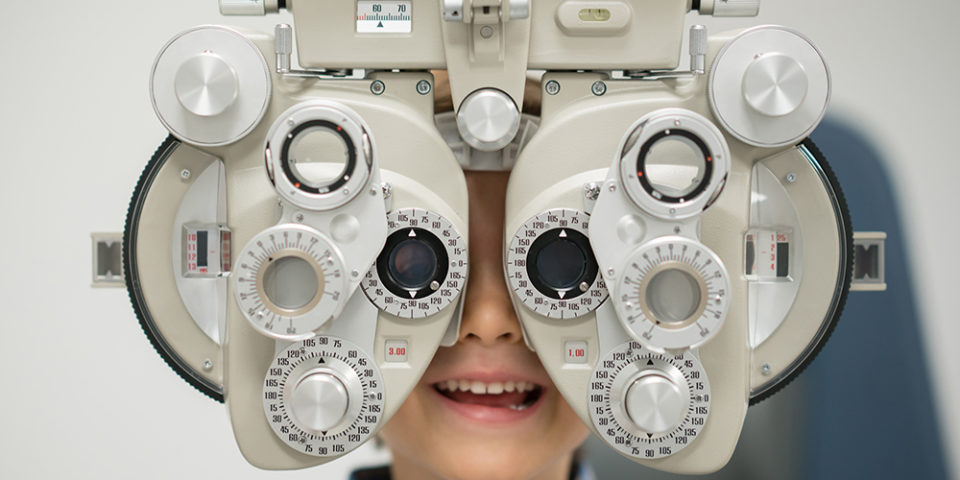Does your child need an eye exam?
If your child can see a tiny insect across the room, their vision should be fine, right? Pediatric ophthalmologist Alexander Pogrebniak, MD, said not necessarily. He explained why regular eye screenings for children are important.
“Frequently, parents will be surprised to learn that their son or daughter has a vision problem. Finding a dark speck on a wall based on contrast does not automatically mean the child is seeing a clearly focused shape. Also, children who seem to have good vision at home may be using only one eye to see,” said Dr. Pogrebniak.
This can pose a risk to a child’s visual development.
The vision centers in a child’s brain are neurologically developing until a child is about 8 to 10 years old. If both eyes are not being used correctly by the brain – for instance, if one eye is out of alignment or if one or both eyes are out of focus – then the vision centers do not have a chance to develop correctly during childhood and vision deficits will become permanent. This condition is called amblyopia and is one of the important reasons for vision screening.
What is vision screening vs. an eye exam?
A vision screening looks for eye and vision problems that require further evaluation. Screenings are done in the pediatrician’s or primary care physician’s office during regular health checkups and also may be performed by specially trained personnel in the school or daycare setting.
Screenings in younger children often use a specialized camera to assess the red reflex in the child’s pupil for alignment and clarity. In older children, eye charts with pictures, symbols, or letters are often used to check and compare the vision in each eye.
“A vision screening looks for problems and risk factors, but it is not a complete eye examination,” said Dr. Pogrebniak.
Comprehensive eye evaluation by an eye specialist is required if your child is unable to pass the vision screening. Eye examination typically includes dilation of the pupils with eye drops and may take about two hours to complete.
Dr. Pogrebniak said an eye exam should be done in these situations:
- Your child’s vision screening was abnormal
- Your child was not able to complete the vision screening (the pediatric ophthalmologist has techniques and equipment to overcome some barriers to cooperation and age)
- Your child has eye or vision symptoms or learning concerns
- Your child has an increased risk of eye problems due to conditions such as prematurity, diabetes, sickle cell disease, developmental delay, previous eye injury, or a family history of eye problems
- Your state requires a comprehensive eye examination (South Carolina does not)
- You believe your child would benefit from an eye examination before starting kindergarten or have any concern about your child’s eye health or vision
What are some signs a child might have a vision problem?
Let your child’s doctor know if you notice any of these symptoms:
- Persistent redness, swelling, or discharge from the eyes
- Excess tearing or sensitivity to light
- Eye misalignments, such as one or both eyes turning inward or outward
- Consistent shaking of the eyes
- Droopy eyelid
- Headaches, especially with reading
- Squinting of the eyes
- Excessive blinking
- Reading difficulty
- Turning or tilting the head to see objects
- Poor vision
What are some common vision problems in children?
- Strabismus (eye misalignment). This condition develops in up to 5% of children and sometimes may be easily seen. In other children, it might be detected only on the eye exam.
- Amblyopia (poor visual development). This condition is present in up to 4% of children. It may lead to permanent visual impairment if not treated in childhood.
- Refractive errors (needing glasses). Up to 20% or more of children need glasses for issues including myopia (nearsightedness, or cannot see far away), excessive hyperopia (having to focus excessively to see), or astigmatism (the eye is shaped liked football, creating distortion of vision).
- Other health issues. Many less common problems may impact a child’s vision and overall health, including previous infections, genetic conditions, and neurologic conditions.
Dr. Pogrebniak said an eye exam can help deal with vision abnormalities before they lead to further problems. “It’s important to make sure children have the proper eyesight to help them succeed in school and in life. Children should have the advantages of good eye health and vision.”
Find a doctor
Whether you’re looking for a primary care physician or need to see a specialist, we’re here to help with experienced, compassionate care near you.
Find a Doctor

